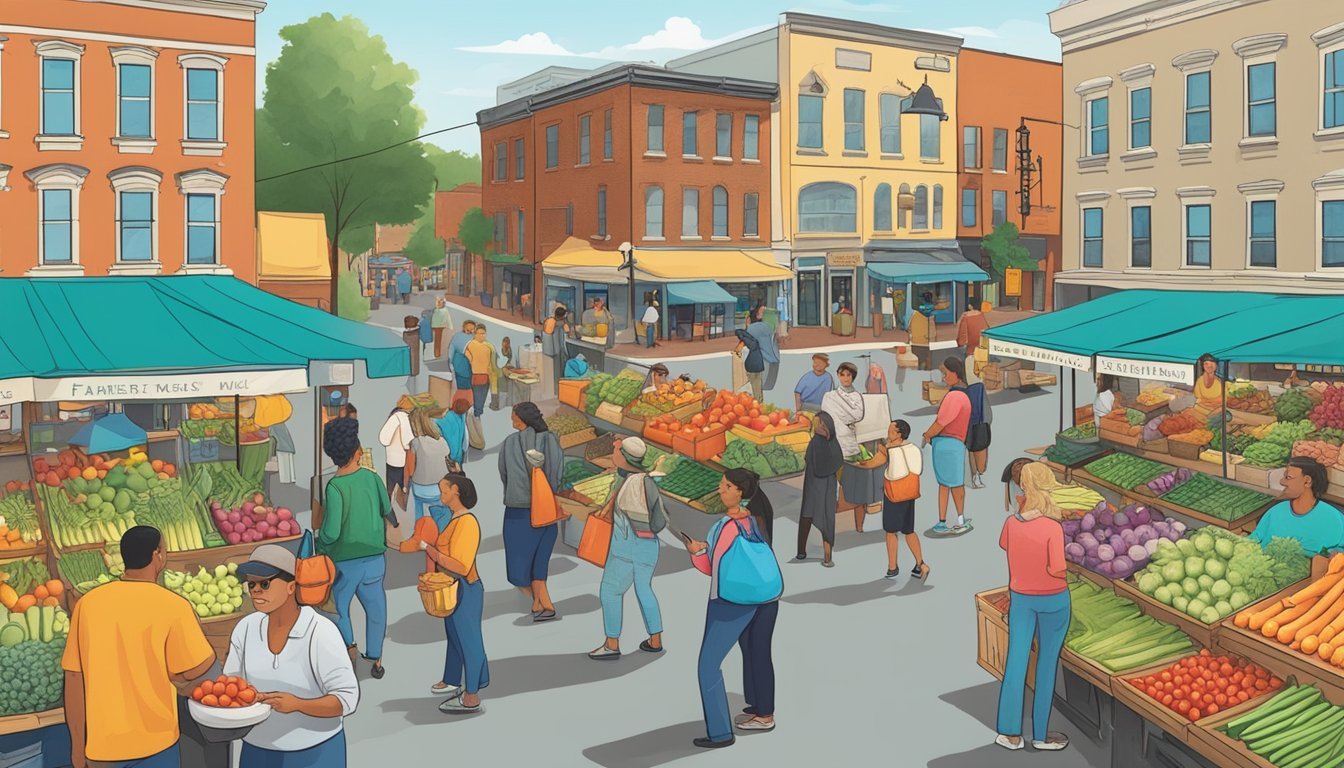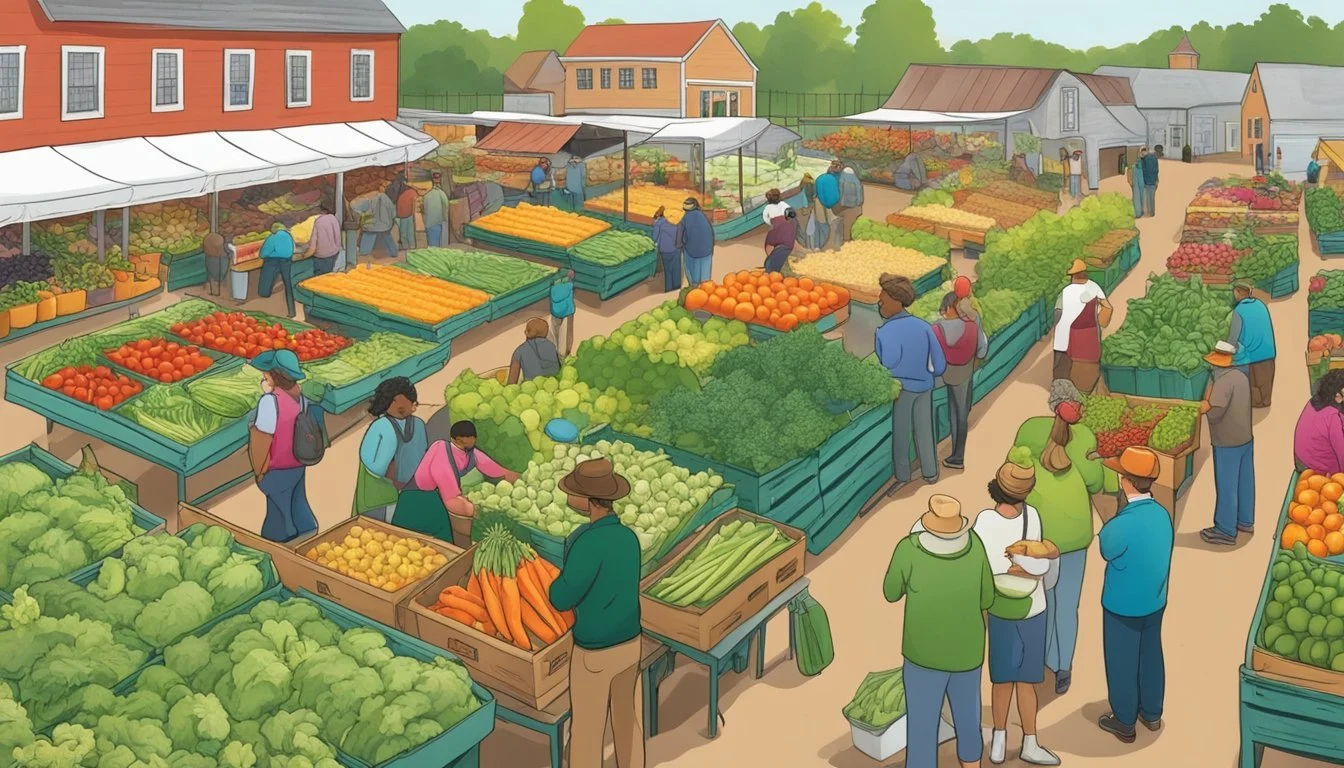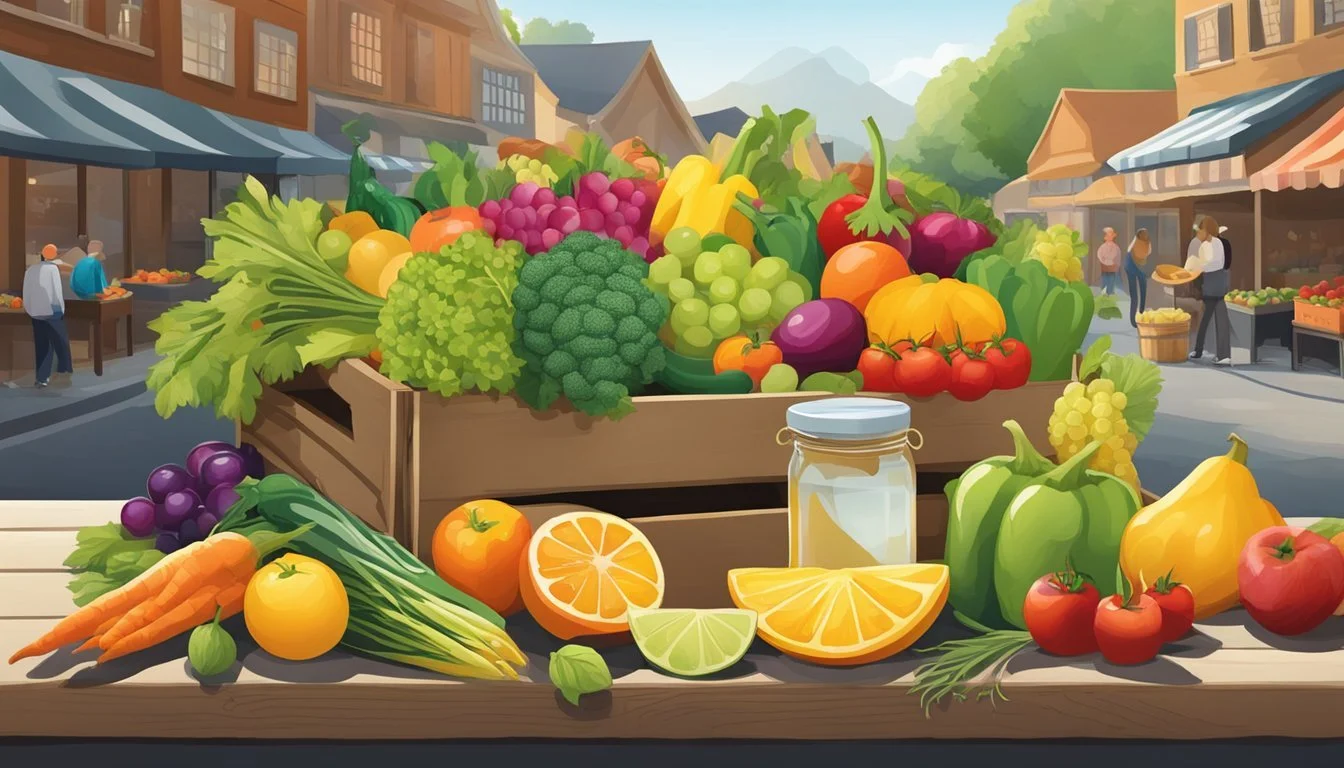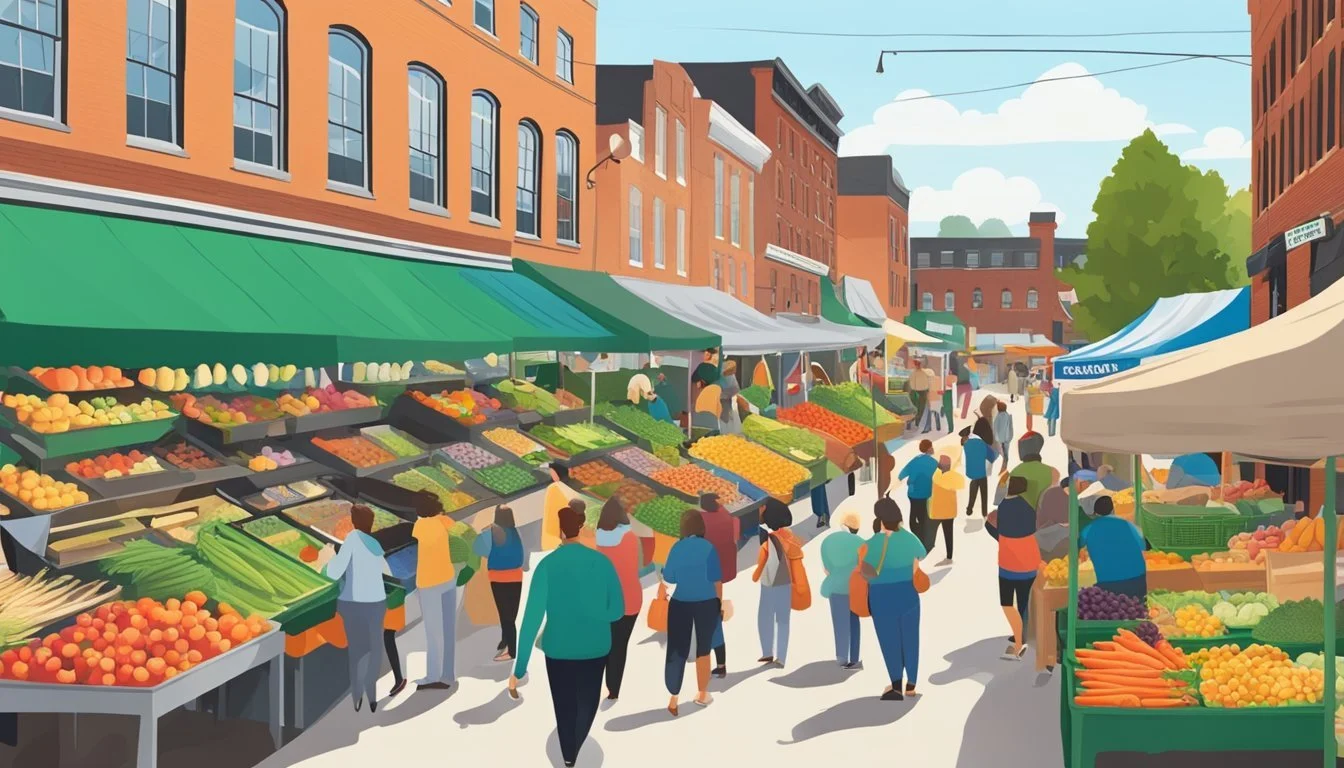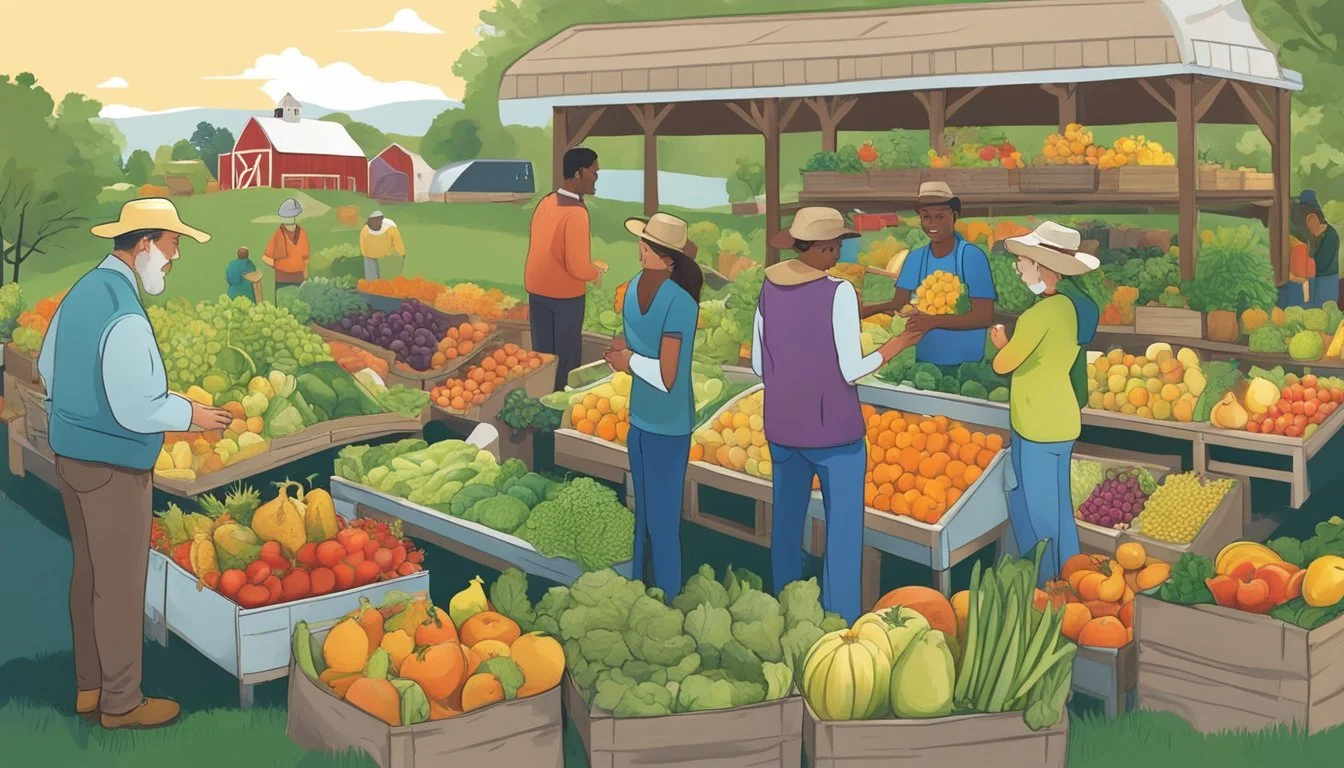Community Supported Agriculture (CSA) in Lowell, MA
A Guide to Local Produce Sharing Programs
Community Supported Agriculture (CSA) represents a growing movement towards locally sourced food and agricultural sustainability, and it has found a productive environment in Lowell, Massachusetts. By fostering direct relationships between consumers and farms, CSAs in Lowell allow residents to subscribe to regular deliveries of fresh produce. Subscribers typically pay for a season’s worth of products upfront. This model not only guarantees financial support for local farmers but also encourages community engagement and a deeper understanding of where food comes from.
Lowell has embraced this model through various initiatives that connect the community with the agricultural processes right at their doorstep. Organic produce, sourced from farms like Barrett's Mill Farm, is made available to residents through CSA programs and farm stores, which specialize in a wide range of vegetables, fruits, and even flowers. These programs are not just about providing food; they frequently offer the chance for members to partake in farm activities, enhancing the connection between people and the land.
Moreover, Lowell's CSA programs are supported by institutions that aim to bolster sustainability and local agriculture. For instance, the University of Massachusetts Lowell has integrated CSA programs into its sustainability initiatives, partnering with local farms like Mill City Grows. Funded through grants and university support, these CSA programs serve to spread awareness of sustainable farming practices and ensure that university faculty, staff, and students have access to nutritious, locally harvested food.
The Basics of CSA
Community Supported Agriculture (CSA) embodies a partnership between farms and the community, providing members with a season's worth of fresh and nutritious produce. This agricultural model prioritizes environmental sustainability and fosters a direct link between consumers and their food source.
Defining CSA
CSA is a term that refers to a mutual agreement between a farm and a community of supporters. Members pay for a share of the farm's harvest in advance, effectively becoming stakeholders in the farm's seasonal production. A share typically includes a weekly or bi-weekly delivery of fresh produce such as vegetables, fruit, and herbs throughout the farming season.
Structure: Farmers offer a variety of share options, from full shares suitable for families to smaller, individual-sized shares.
Duration: A traditional CSA season can range from late spring to early autumn, depending on the regional climate and farm capacity.
Benefits of CSA Membership
Joining a CSA brings multiple benefits to both the members and the farm. For individuals and families, CSA membership guarantees a supply of fresh, nutritious, and often organically grown food.
Health: Members consume seasonally fresh produce, increasing the nutritional value of their diets.
Environment: CSA reduces food miles as produce is local, thus lowering carbon footprints and supporting sustainable farm practices.
Economy: Members' upfront payments provide farms with the necessary capital to plan and plant at the beginning of the season.
Community: It promotes community engagement and a stronger connection between consumers and the source of their food.
Farmers benefit from a reliable market for their produce and can concentrate on land stewardship and quality food production rather than solely on marketing efforts.
CSA Farms in Lowell
In Lowell, MA, CSA farms provide residents with opportunities to access fresh, locally-grown produce while supporting sustainable farming practices.
History of CSA Farms in Lowell
The concept of Community Supported Agriculture in the United States found its roots in Massachusetts in 1985, spearheaded by Robyn Van En. Lowell, located in the heart of Massachusetts, has been part of this movement that underscores the importance of local food systems and sustainable agriculture. CSA farms in and around Lowell have been thriving by creating a direct connection between farmers and consumers.
Selecting a CSA in Lowell
When choosing a CSA in Lowell, potential members should consider several factors:
Payment Schedule: Most farms tend to prefer payment upfront for the season; however, some may offer the flexibility of weekly or monthly payments.
Work Requirements: Some CSAs might require members to contribute a small number of hours working on the farm.
Produce Offered:
Vegetables: A wide array is typically available, often comprising around 50 types of vegetables.
Fruits: Depending on the farm, the selection may be limited or quite extensive.
Herbs: Fresh herbs are commonly included as part of the CSA offerings.
Here’s a brief overview of what a local CSA might look like:
Feature Description Location Based in or around Lowell, MA Type Often includes certified organic farms Product Range Offers vegetables, fruits, and sometimes additional products like eggs or flowers
In Lowell, each CSA farm has its unique approach, so it's imperative for individuals to research and find a CSA that aligns with their preferences.
What to Expect from a CSA Share
When joining a Community Supported Agriculture program in Lowell, MA, subscribers are purchasing a portion of the farm's production ahead of the growing season. They can anticipate weekly distributions of fresh, locally grown food which typically include a variety of produce and may also extend to products like meat and dairy.
Seasonal Availability
A CSA operates on the principle of seasonal eating. Members typically receive a selection of:
Vegetables: Roots, leafy greens, and seasonal specialties like squash or tomatoes.
Fruit: Berries, apples, and other regionally appropriate options.
Herbs: Cilantro, basil, and other essential cooking herbs.
Flowers: Some CSAs provide bouquets during specific periods.
The composition of CSA shares reflects the local agricultural calendar, ensuring that subscribers get the freshest possible produce at the peak of its flavor and nutritional value. The shares evolve throughout the year, from leafy greens in the spring to hearty squashes in the fall.
Share Options
CSAs often offer various share sizes and types to accommodate different needs. Share options may include:
Standard Vegetable Share: A mix of common and unique vegetables.
Fruit Add-On: Often available as an extra to the standard vegetable share.
Meat, Milk, and Eggs: Some farms provide options to include locally sourced animal products.
Specialty Shares: May include items like artisanal cheese, fresh herbs, or cut flowers.
Sizes and content of these shares vary, aiming to suit single individuals, couples, or families. Some CSAs allow customization of shares, while others predetermine the contents based on what is available each week.
Subscribers to a CSA not only enjoy fresh farm produce but also participate in the local food system by directly supporting farmers and contributing to sustainable agricultural practices.
Community and Environmental Impact
Community Supported Agriculture (CSA) in Lowell, MA, not only bolsters the local economy but also advances sustainable agricultural practices, creating a positive environmental footprint.
Supporting Local Economy
CSAs play a pivotal role in strengthening Lowell's economy. By subscribing to CSA programs, residents directly fund local farms like Mill City Grows, ensuring financial stability and growth. This direct-to-consumer model reduces transportation costs and bolsters local employment. Funds such as the S.E.E.D. grant encourage the development of such initiatives, further embedding CSAs into the community's economic fabric.
Direct Financial Support: CSAs provide immediate revenue for farmers, improving their economic resilience.
Local Job Creation: Farms operating CSAs employ local workers, supporting the community's employment rates.
Promoting Sustainable Practices
Lowell's CSA providers, such as those certified organic by Barrett's Mill Farm, are at the forefront of promoting environmentally friendly farming methods. Participation in CSAs supports land stewardship and the production of locally grown, often organic, produce. These sustainable practices contribute to soil conservation, reduced pesticide use, and lower carbon emissions due to minimal transportation of goods.
Soil Conservation: Organic farming techniques improve soil health and reduce erosion.
Reduced Carbon Footprint: Localized food systems diminish long-distance food transport, cutting greenhouse gas emissions.
How to Join a CSA
Joining a CSA in Lowell, MA, provides residents with a way to obtain fresh, local produce while supporting local agriculture. The process typically requires upfront membership enrollment, followed by regular pick-up or delivery of produce shares.
Enrollment Process
Individuals interested in joining a CSA must generally complete a membership application and pay for their share of the farm’s produce in advance. This upfront financial commitment helps farmers plan for the season and cover initial production costs. Prospective members should check with specific CSA farms for registration periods, as these can vary and spots may be limited. Once enrolled, members receive confirmation detailing their share options and any additional participation requirements such as volunteer hours.
Typical Enrollment Steps:
Research and select a CSA farm in Lowell, MA.
Complete the membership application.
Choose the desired share type (vegetable, fruit, herbs, etc.).
Pay the membership fee upfront, if required—or inquire about payment plans.
Pick-up and Delivery Options
Most CSAs offer weekly pick-up locations where members can collect their shares at designated times and places. In Lowell, these may include farm stands, local markets, or other community spaces. Some CSAs might also provide a delivery service to members’ homes or central points within the city for an additional fee. The frequency of deliveries and pick-up schedules are typically communicated at the start of the season and are designed to coincide with harvest times.
Common Options for Receiving Shares:
Weekly Pick-up: At the farm, market, or specified community location.
Delivery: To home or a centralized drop-off point (may include delivery charge).
CSAs Beyond Produce
Community Supported Agriculture in Lowell, MA, extends beyond the fields of fruits and vegetables to also include a variety of farm products like meat, dairy, and additional items such as herbs and flowers.
Meat and Dairy
CSAs in the Lowell area offer local residents a chance to enjoy fresh, quality meat products alongside their produce. Members can access a range of meat options, which often include:
Pastured Pork: Raised on open fields to ensure high-quality and flavorful meat.
Lamb: Tender and carefully raised by local farmers specializing in small-scale husbandry.
Poultry: Fresh and often free-range chickens available during specific times of the year.
100% Grass-Fed Beef: This beef comes from cows that have grazed on grass for their entire lives, promising a rich taste and leaner profile.
These meats are typically available through various CSA shares or as additional purchases. As for dairy, consumers can often find products like:
Milk: Fresh from the farm, some CSAs in the Lowell area may offer whole, pasteurized, or raw milk options from cows or goats.
By supporting these CSA options, consumers help sustain local farming, ensure animal welfare, and receive nutritious, high-quality products.
Additional Farm Products
CSAs are not limited to traditional farm offerings. Many provide an assortment of other farm-grown items:
Herbs: Various seasonal herbs are often available, enhancing the culinary experience with fresh flavors.
Flowers: Some CSAs cultivate colorful flowers, which may be included in the share or offered as an add-on to brighten homes and tables.
These items enhance the diversity of CSA shares while supporting local agriculture with products that are as fresh as their produce counterparts. They add extra value to the CSA experience, allowing for a deeper connection with the land and its bounty.
Exploring Nearby CSA Options
In the Lowell area, residents seeking fresh, locally grown produce have access to a variety of Community Supported Agriculture programs. These CSAs offer regular deliveries of farm products, fostering a connection between consumers and local agriculture.
Greater Boston Area CSAs
In the Greater Boston area, individuals can explore several CSA options that cater to a desire for fresh, organic produce. For instance, Warner Farm, located in Sunderland, operates a long-standing CSA program. They provide a wide variety of vegetables, and sometimes fruits or herbs, to members in the Boston vicinity. Additionally, farms in the Concord vicinity extend CSA shares, ensuring residents have access to seasonal produce from early summer into the fall.
Warner Farm (Sunderland)
Season: June to October
Share Options: Vegetables, fruit add-ons
Pick-up Locations: Various, including Greater Boston area sites
Season: Varies, typically May to October
Share Options: Depending on the farm, may include vegetables, fruits, flowers, and herbs
Pick-up Locations: On-farm and other local spots
New England Regional CSAs
The New England region offers a broad selection of CSA programs, including those that serve the Greater Boston and extended areas. These CSAs may feature a more extensive distribution network, providing shares not just within Massachusetts but across state lines when applicable. The produce distributed through these CSAs often reflects the diverse agriculture of New England, giving members a taste of the varying seasonal offerings.
Regional Farms
Season: May vary; often May to November
Share Options: Typically includes vegetables; may also offer fruits, dairy, meat, and other farm products
Distribution: Includes a range of pick-up locations, possibly even home delivery options
Residents in Lowell can participate in CSA programs both within the Greater Boston area and those spanning the broader New England region. These CSA shares are an excellent way for consumers to support local farms while enjoying the freshness and quality of seasonal, locally-sourced produce.
Supporting New Farmers
The vitality of the local food system in Lowell, MA benefits significantly from initiatives aimed at nurturing new farmers. These efforts provide vital education and facilitate access to land, ensuring these beginners have the groundwork to cultivate successful farming ventures.
Education and Training Programs
New farmers in Lowell receive foundational support through comprehensive education and training programs. These programs often cover a wide range of necessary farming knowledge, including how to select quality seeds, employ fertilizers judiciously, and effectively manage labor. Understanding that starting a farm is multifaceted, the curricula strive to impart practical skills that ensure healthy crop production and farm sustainability.
Core Subjects: Crop planning, soil health, sustainable farming practices
Skills Development: Business management, market analysis, financial planning
Through structured courses and hands-on workshops, farmers are equipped to handle the rigors of farm operations and make informed decisions that contribute to their long-term success.
Land Access Initiatives
Land access is a critical barrier for beginning farmers, yet Lowell has addressed this through targeted initiatives. Organizations work toward securing land for agricultural purposes and often facilitate relationships between new farmers and landowners. Land access programs focus on removing entry barriers and may provide:
Land Matching: Connecting new farmers with available land
Leasing Terms: Negotiating fair and sustainable lease agreements
Legal Support: Assisting with understanding the legalities of land use
Through these programs, farmers find the soil they need to sow their seeds, cultivate crops, and grow their farming enterprises from the ground up. Access to land is a critical step that ensures the continued growth and diversity of local agriculture in communities like Lowell.
Addressing Food Security
Community Supported Agriculture (CSA) initiatives in Lowell, MA, serve as vital components in enhancing food security. By understanding and improving CSA accessibility and advocating through outreach and community programs, Lowell aims to address food shortages in the region.
CSA Accessibility
Lowell's CSA programs improve access to fresh, nutritious produce, thus tackling food insecurity head-on. They offer weekly baskets of produce to subscribers, ensuring a steady supply of healthy food options. The CSA model enables residents to engage directly with local agriculture, fostering a community-based approach to food security.
Lowell, MA, CSA Options:
CSAs providing weekly produce: Fresh, seasonal selections available.
SNAP certified: Subsidies and match programs aid affordability.
Subsidized CSAs: Potential models to improve diet quality.
Outreach and Community Programs
Outreach initiatives and community programs within Lowell play pivotal roles in augmenting the impact of CSAs. They prioritize education and awareness, connecting local farmers, artisans, and communities. Efforts include farmers markets and partnerships with local organizations aimed at nourishing body, mind, and spirit.
Program Highlights:
Farmers Markets: Platforms for fresh, local produce, and SNAP certification.
Lowell Food Security Coalition: Collective action to support community food assessments.
Local Food Purchase Assistance: USDA-supported program to bolster food supply chain resilience within the Greater Boston area.
Lowell's concerted efforts in these areas strive to fortify the region's food hub while addressing nutritional needs.
Supplementary Activities and Events
Community Supported Agriculture (CSA) in Lowell, Massachusetts offers more than just a weekly share of fresh produce. Participating farms often host events and workshops that provide members and the local community with additional value and engagement opportunities.
Farm Visits and Festivals
Several CSA farms in and around Lowell invite members to visit the farm for a first-hand experience of farm life. These visits are crucial for fostering community ties and provide an opportunity for families to connect with the food they consume. Additionally, farms may organize seasonal festivals that transform the harvest into a celebration of local produce and farm accomplishments. Such events can include:
Family Dinner Nights: Farms may host dinners using their own ingredients, strengthening the bond between the land and the local food culture.
Harvest Festivals: Celebrating the bounty of the seasons, these events often include u-pick events, hayrides, and other family-friendly activities.
Educational Workshops
CSA farms in Lowell function as educational hubs, where members can deepen their knowledge about sustainable agriculture and food systems. Workshops typically cover:
Sustainable Farming Practices: Participants learn about eco-conscious farming techniques that contribute to a healthier environment.
Food Preparation: Members might attend cooking classes that teach how to prepare meals from the local produce they receive, emphasizing nutrition and seasonal recipes.
By engaging in these supplementary activities, CSA members in Lowell, MA can enhance their understanding of agriculture, enjoy community-centered events, and make more informed choices regarding food and sustainability.
Regulations and Certifications
In the context of Community Supported Agriculture (CSA) within Lowell, Massachusetts, adherence to organic certification standards and compliance with local and state guidelines are integral for CSA farms to operate legally and ethically.
Organic Certification
CSA farms in Massachusetts that promote themselves as "organic" must comply with the USDA's National Organic Program (NOP). Barrett's Mill Farm, as an example, operates as a certified organic farm. Certification requires the farm to follow a strict set of procedures to avoid synthetic pesticides and fertilizers, ensure proper soil management, and maintain ecological balance. To retain their status, organic CSA farms undergo annual inspections and must keep detailed records of their farming practices.
Local and State Guidelines
CSA farms operating in Lowell, MA must adhere to guidelines set forth by the Massachusetts Department of Agricultural Resources (MDAR). This involves registering the farm with the state, following zoning regulations specific to Lowell, and meeting food safety standards. Additionally, farms that offer shares to the public, like those participating in the UMass Lowell urban agriculture program, must comply with the regulations governing direct-to-consumer sales. Local regulations also include labor practices and may dictate participation or hours worked on the farm by CSA members, as seen in some Massachusetts CSA models.
Frequently Asked Questions
This section addresses inquiries related to Community Supported Agriculture (CSA) memberships, including common questions and concerns of members in Lowell, MA.
Common CSA Queries
What is a CSA?
A CSA stands for Community Supported Agriculture, where individuals purchase a share and in return receive periodic deliveries of farm produce during the farming season.
How long is the CSA season in Lowell, MA?
The typical CSA season varies, but it generally spans from late spring through fall, often delivering produce for about 20 weeks.
What can members expect in their CSA delivery?
Members typically receive a variety of vegetables, and sometimes fruits or herbs, depending on the specific offerings of the CSA.
Are there options for payment in Lowell's CSA programs?
While most farmers prefer upfront payment for the season, some CSA programs in Lowell might allow weekly or monthly installments.
Troubleshooting Member Concerns
What if a member can't pick up their CSA delivery?
Members should contact their CSA provider to discuss alternative pick-up options. CSA programs may accommodate by holding the produce for a different pickup day or allow a friend or family member to pick up the share.
Is work on the farm required for CSA members in Lowell?
Some CSA farms may require members to contribute a small number of work hours during the season; however, this varies by farm.

